- Home
- Ron Chernow
Grant Page 11
Grant Read online
Page 11
In June 1851, the Fourth Infantry was transferred to Sackets Harbor and Grant at first welcomed returning to a place where he and Julia had launched many satisfying friendships. It occurred at a time when Julia had taken the baby to visit the Grants in Bethel and then enjoyed an extended stay with her family in St. Louis. Little Fred had been very sick in Detroit, likely accounting for Julia’s desire to take him somewhere with superior medical care. Almost as soon as she and the baby were gone, Grant keenly missed them. “You don’t know how anxious I am to see him,” he wrote to Julia. “I never dreamed that I should miss the little rascal so much.”36 Grant had quicky grown domesticated, a doting father at loose ends without his family. As had happened during the Mexican War, he was a faithful correspondent, whereas Julia’s letters turned up sporadically, arousing his already palpable anxiety. “Your not writing keeps me in constant suspense lest poor little Freddy may be sick again,” he informed her after arriving at Sackets Harbor. “Has he improved much since he left? . . . I feel a constant dread lest I shall hear bad news.”37
In his frequent letters, Grant tried hard to sound cheerful and sang the praises of Sackets Harbor with its cool, salubrious climate and excellent fishing, sailing, riding, and picnics. Yet he admitted the town was “as dull a little hole as you ever saw,” and his letters thinly veil a creeping depression dampening his spirits.38 Again and again he complained that Julia did not write often enough, beseeched her to come sooner to Sackets Harbor, and referred to her reluctance to leave St. Louis. He may have dreaded that she was ensnared again in the predatory talons of Colonel Dent and appeared pathetically eager for scraps of news about his baby boy. “Do you think he recollects me?” he asked Julia. “Has he any more teeth? You don’t tell me anything about him.”39 Even though he renewed ties with old acquaintances, the distant outpost did not seem nearly as sociable without Julia. One wonders whether her infrequent letters resulted from her eye problem or whether she silently punished her husband for subjecting her to a cheerless existence at remote army bases. Deprived of the foundation of her love, Grant seemed solitary, adrift, afflicted with excess nervous energy. The underlying pathos of his life grew painfully apparent. As one officer observed, Grant “was regarded as a restless, energetic man, who must have occupation, and plenty of it, for his own good.”40
Loneliness, ennui, frustration, inactivity—such unsettled feelings always conspired to drive Grant to drink. Luckily, he recognized his alcoholism just as the temperance movement gathered strength, and he embraced this new faith with fervor. “I heard John B. Gough lecture in Detroit the other night,” he told a Sackets Harbor friend, “and I have become convinced that there is no safety from ruin by drink except from abstaining from liquor altogether.”41 The full-bearded John Bartholomew Gough was a reformed drinker and failed actor who delivered temperance speeches that mingled folksy humor with spellbinding theatricality to convert wavering listeners. He was a charismatic spokesman for the Washingtonian movement, which was inaugurated in a Baltimore barroom in 1840 and urged adherents to sign pledges of abstinence. It has been estimated that the indefatigable Gough gave more than ten thousand speeches, reaching more than nine million grateful people.42 He was fond of recounting how he had lost his wife and child from drink, a theme that would have resonated powerfully with Grant.
At Sackets Harbor, Grant helped to organize the Rising Sun Division, Lodge No. 210, of the Sons of Temperance and took the pledge not to “make, buy, sell, or use, as a beverage, any Spiritous or Malt Liquors, Wine, or Cider.”43 Despite some local hostility, he advertised his involvement by wearing the lodge’s white sash and red-white-and-blue ribbon in his lapel. He talked freely about his problem with his friend Walter Camp, who recalled that Grant “gave hearty encouragement to the order in the village by his presence. He marched once in the procession, wearing the regalia of the lodge. I heard him refuse to join in a drinking bout once . . . It took courage in those days to wear the white apron of the Sons of Temperance, but Lieutenant Grant was prepared to show his character.”44 Stubbornly protective of her husband’s reputation, Julia Grant always refused to admit publicly to his drinking problem, but her early biographer Ishbel Ross notes, “Grant attended the weekly meetings with Julia’s hearty approval. She hung his parchment proudly in their home.”45
In September 1851, Grant insisted that Julia and the baby come to Sackets Harbor, and she arrived to discover that Grant had charmingly, if rather clumsily, fitted out their small quarters. “I remember a fine center table and two large fine chairs that were so high that when I sat in them my feet were quite a foot from the floor,” the diminutive Julia noted. “This mistake was overcome by his having two pretty little stools made for my feet to rest upon when I sat in those chairs of state.”46 The remainder of their Sackets Harbor stay passed pleasantly enough with diversions ranging from bowling to sleigh rides across the frozen expanse of Lake Ontario, bundled under buffalo robes. They played whist and checkers and attended church.
The Sackets Harbor idyll ended in May 1852 when the Fourth Infantry was ordered to the West Coast, triggering a slow-motion crisis in Grant’s life. The Gold Rush had drawn a stampede of settlers to California that demanded a strengthened military presence. At first, Julia indulged in quaint fantasies of a joint trip and pictured going “through the Caribbean Sea, parting its slashing, phosphorescent waves and sailing under the Southern Cross.”47 But she was now seven months pregnant with their second child, and Grant realized she could not brave the extreme perils of travel from New York to San Francisco. “You know how loath I am to leave you,” he told her, “but crossing Panama is an undertaking for one in robust health; and then my salary is so small, how could you and my little boy have even the common necessaries of life out there.”48 In the end, Julia sadly acquiesced. She and two-year-old Fred went to stay with the Grants and then the Dents, forcing Ulysses to hazard the journey alone. For four grueling years, they had endured separation during the Mexican War and ever since had struggled to forge a stable family life. Now Grant was again being deprived of the one thing indispensable for his emotional health and well-being. Eventually, he hoped, Julia and Fred would be able to join him, but he had no assurance of that as he journeyed to Governors Island in New York to prepare his regiment for the taxing journey to Panama, across the isthmus, then up the West Coast to San Francisco.
Before sailing, Grant squeezed in a three-day trip to Washington to settle the matter of the stolen $1,000 in regimental funds that had hovered over him since leaving Mexico. By an unfortunate coincidence, the renowned Whig leader Henry Clay died just before Grant checked into the fashionable Willard Hotel, and he found government offices shut down and the whole town draped in mourning. A southern city still dependent upon slavery, Washington was a dusty, unpaved place with open drainage canals and army cattle browsing around the unfinished Washington Monument. “I was very much disappointed in the appearance of things about Washington,” Grant confided to Julia. “The place seems small and scattering and the character of the buildings poor.”49 While Grant knew almost a dozen members of Congress from the Mexican War, he grew frustrated in tracking down a solution to his problem. It required a congressional act to resolve the matter, and the Military Committee of the House of Representatives would not meet until after he departed Washington. Thus, no action was taken on his petition. For such a proud, honorable man, the stigma of the missing funds must have still rankled.
—
AT GOVERNORS ISLAND in New York Harbor, Grant and his regiment endured sweltering weeks of countless drills and roll calls until they attained the requisite number of troops to travel. It was an arduous task to transport an entire infantry regiment and its cumbersome equipment to the West Coast and much of the onus fell on the capable quartermaster. One soldier retained a distinct memory of Grant, “a thin, quiet, reticent man, full of kindly and generous feelings for those about him, giving close and strict attention to his duties.”50 Knowing the rainy
season had descended on Panama, with cholera everywhere, Grant already had queasy feelings about the journey and was eager to sail before conditions worsened there. Major Charles S. Tripler, the regimental surgeon, warned the War Department that it would be “murder” to move men through a zone rife with cholera, but he was blandly reassured by army brass that the epidemic would be “quickly over.”51 In the end, his anxiety proved more than justified.
From the outset, the ill-fated trip was an irremediable fiasco. People headed for the California Gold Rush packed the ships bound for Panama—traveling across the continent by wagon train was deemed too dangerous—and only at the last instant did the War Department book places aboard the steamer Ohio. By that point, the ship had secured its full complement of civilian passengers. The Fourth Infantry added 730 people—650 soldiers, 60 wives, and 20 children—so that a vessel built for 330 passengers groaned under a burden of nearly 1,100. The journey on the side-wheeler had a voyage-of-the-damned quality, its three open decks constantly crammed with people milling about to escape stifling conditions belowdecks.
Despite remarkably fine weather and the diversion of fishing, card playing, and whale watching, Grant and other passengers fell hopelessly seasick on the lurching voyage. As the ship edged toward Panama, he scribbled a last letter to Julia: “I write this on deck, standing up, because in the cabin it is so insufferably hot that no one can stay there.” Julia was about to give birth to their second child. The first son having been named after Colonel Dent, Grant insisted upon balancing the family ledger. “If it is a girl name it what you like,” he wrote, “but if a boy name it after me.”52 Indeed, one week later, on July 22, 1852, Julia gave birth to Ulysses S. Grant Jr. Born in Bethel, Ohio, where Julia had stayed with her in-laws, the boy for the rest of his life sported the nickname “Buck” bestowed by White Haven slaves to honor the Buckeye State. “Mother always told us her greatest regret was not accompanying [Father] to the west,” Buck said later, “but in her delicate condition the doctors forbade it.”53 Grant retained vague hopes that Julia would join him that winter, though he would not set eyes on her or the two boys for a couple of miserable years.
On the boat, Grant tolerated the crusty supervision of his commanding officer, Lieutenant Colonel Benjamin L. E. Bonneville, a flamboyant character partial to white beaver hats. He liked to stride the deck, cane in hand, provoking so many quarrels among his men that Grant often had to adjudicate. Bonneville had tried and failed to replace Grant as quartermaster and the latter smarted under the affront. Grant became an “incessant smoker,” who seldom went to bed before 3 a.m., observed a passenger, and “during every day and an early part of each night . . . I would see him pacing the deck and smoking, silent and solitary.”54 The ceaseless smoking betrayed an inner restlessness, doubtless an amalgam of missing Julia and enduring the crushing pressures of the overcrowded ship.
The situation was ripe for a resort to alcohol, and Grant was innocently abetted by the ship’s captain, James Findlay Schenck, who was profoundly impressed by him. Grant “seemed to me to be a man of an uncommon order of intelligence. He had a good education, and what his mind took hold of it grasped strongly and thoroughly digested.”55 Schenck, with no inkling of his drinking history, recalled Grant’s “excellent taste for good liquors. I had given him the liberty of the sideboard in my cabin, and urged him frequently never to be backward in using it as though it were his own, and he never was. Every night after I had turned in, I would hear him once or twice, sometimes more, open the door quietly and walk softly over the floor so as not to disturb me; then I would hear the clink of the glass and a gurgle, and he would walk softly back.”56 These late-night raids on Schenck’s liquor cabinet fit Grant’s later pattern of private, late-night indulgence in alcohol. It seemed as if with Julia’s absence the discipline of the temperance movement and the ringing exhortations of John Bartholomew Gough crumbled during a tumultuous week at sea.
When the ship arrived at the port of Aspinwall, the steaming town, drenched with torrential rains, stood “eight or ten inches under water,” Grant wrote, “and foot passengers passed from place to place on raised footwalks.”57 According to Schenck, Grant remained “sleeplessly active” in rescuing his charges from the submerged city.58 A new railroad lay under construction across the isthmus, and terrifying reports contended that forty of one hundred workers had perished from cholera. The Fourth Infantry took this incomplete railroad as far as the Chagres River, where they boarded long, flat-bottomed boats pushed along by scantily clad locals wielding long poles. When they reached the upstream town of Cruces, the soldiers marched the remaining distance, but their families were supposed to mount mules to carry them across the mountain trails. Here disaster struck. The steamship company had signed an agreement with a contractor who failed to deliver a single animal, the Gold Rush passengers having wooed them away with higher prices. Still worse, no agent of the steamship company even greeted the party. As Grant wrote, “There was not a mule, either for pack or saddle, in the place.”59
With his split metabolism, Grant came alive in emergencies, drawing upon a fund of strength that often lay dormant in more tranquil times. Taking the initiative as quartermaster, he dismissed the original contractor and entered into an agreement with one who demanded extortionate prices. While Grant wrestled with this intractable problem, “cholera had broken out, and men were dying every hour.”60 Since Bonneville left him with the most vulnerable passengers, Grant stayed behind for a week with 150 sick soldiers, women, children, and regimental baggage until adequate transportation was arranged. Cholera was a swift and lethal disease that could carry off its victims within hours. One woman under Grant’s care, Delia Sheffield, claimed it was “a common sight to see strong men . . . taken with cramps and die in a short time.” In Grant she saw not only a streak of humanity but true nobility in his solicitude for his wards. “Captain Grant . . . and the surgeons did everything in their power to check the spread of the disease, and to alleviate the sufferings of the stricken ones. Too much praise cannot be given them for their tireless energy and great presence of mind during this outbreak of cholera.”61
When Grant and his entourage finally moved out, the women rode mules, led by native guides, while men walked and carried parcels; several nuns had to be hoisted in hammocks. Drum major J. D. Elderkin never forgot how Grant saved his wife by giving him a $20 gold piece to hire a mule, while also furnishing her with a coat to shield her from malarial flies. As they wound over narrow, twisting hillside paths, Grant tended this strange cavalcade, making sure they didn’t drink water from contaminated springs and urging them to drink wine sparingly instead. In spite of these precautions, many members died from cholera and had to be hastily buried by the wayside.
When they at last reached Panama City on the Gulf of Panama—then a backward village of adobe houses with thatched roofs—the cholera epidemic was not yet contained. For the most virulent cases, the coolheaded Grant converted an old relic of a ship into a temporary hospital and bravely tended many patients himself. “He was like a ministering angel to us all,” said Elderkin, “a man of iron, so far as endurance went, seldom sleeping, and then only two or three hours at a time.”62 Altogether Grant estimated that one-third of the people under his care died at Cruces or Panama City as well as one-seventh of the Fourth Infantry group that had left New York Harbor. As the hellish story surfaced, it provoked fierce condemnation of War Department negligence, an indictment Grant endorsed, telling Julia darkly “there is a great accountability somewhere for the loss which we have sustained.”63
To Julia, Grant emphasized the wisdom of having omitted her from the trip. “My dearest you never could have crossed the Isthmus at this season . . . The horrors of the road, in the rainy season, are beyond description.”64 He felt vindicated in not having allowed their firstborn son, Fred, to come along. “Had you come he no doubt would now be in his grave.”65 Grant stated that all twenty children who made the passage died either f
rom the rigors of the overland journey or from diseases contracted along the way. For Grant, with his special fondness for children, this part of the saga must have been particularly haunting.
During the ghastly crossing, Grant had undergone a trial as harrowing as anything he experienced during the Mexican War. The nightmarish odyssey was seared into his memory, and he would unburden himself of the story many times in his life. Perhaps some of this obsession arose from lingering guilt about those he could not save, but there must also have been extraordinary pride in his courage and fortitude. Perhaps no episode before the Civil War so exposed his superlative leadership gifts. From the Panama ordeal sprang his later vision of a canal between the oceans that would do away forever with lengthy, hazardous journeys across the isthmus. Not surprisingly, Grant would always prefer Nicaragua as the site for such a project.
By early August, the exhausted remnants of the Fourth Infantry embarked on the steamer Golden Gate, bound for California. For a month, the soldiers stayed in Benicia Barracks, northeast of San Francisco, until they had recuperated from the Panama crossing and were reinforced by the arrival of additional troops who had been ailing when the steamer sailed. San Francisco was then aflame with Gold Rush fever, and Grant was entranced by its roaring, brawling atmosphere, where men “wore their pantaloons in their boots, and carried about with them an arsenal of bowie-knives and pistols.”66 He was susceptible to get-rich-quick schemes in a city jammed with hucksters of every stripe. “There is no reason why an active energetic person should not make a fortune every year,” he told Julia. “I feel that I could quit the Army to-day and in one year go home with enough to make us comfortable . . . all our life.”67 It appears patent that Grant entertained such pipe dreams because he could not afford to bring his family to the West Coast. “No person can know the attachment that exists between parent and child until they have been separated for some time,” he told Julia. “I am almost crazy sometimes to see Fred.”68

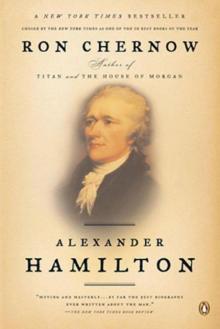 Alexander Hamilton
Alexander Hamilton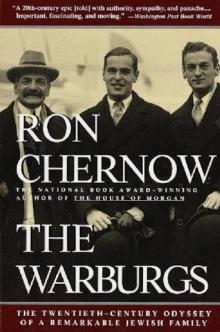 The Warburgs
The Warburgs Titan
Titan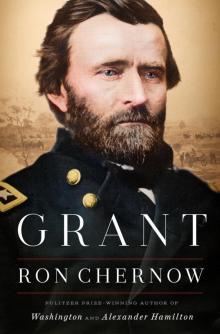 Grant
Grant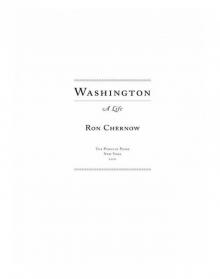 Washington
Washington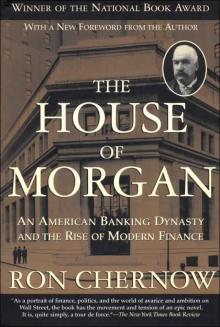 The House of Morgan
The House of Morgan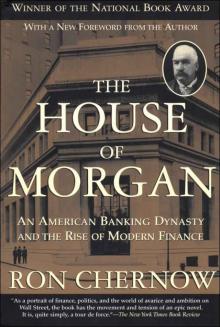 The House of Morgan: An American Banking Dynasty and the Rise of Modern Finance
The House of Morgan: An American Banking Dynasty and the Rise of Modern Finance